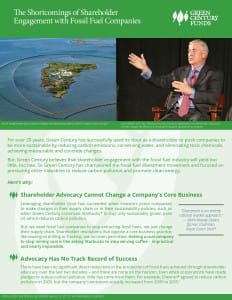The Shortcomings of Shareholder Engagement with Fossil Fuel Companies
For over 20 years, Green Century has successfully used its clout as a shareholder to push companies to be more sustainable by reducing carbon emissions, conserving water, and eliminating toxic chemicals, achieving measurable and concrete changes.
But, Green Century believes that shareholder engagement with the fossil fuel industry will yield too little, too late. So Green Century has championed the fossil fuel divestment movement and focused on
pressuring other industries to reduce carbon pollution and promote clean energy.
Here’s why:
SHAREHOLDER ADVOCACY CANNOT CHANGE A COMPANY’S CORE BUSINESS
Leveraging shareholder clout has succeeded when investors press companies to make changes in their supply chain or in their sustainability policies, such as when Green Century convinced Starbucks* to buy only sustainably grown palm oil, which reduces carbon pollution.
But, we need fossil fuel companies to stop extracting fossil fuels, not just change their supply chain. Shareholder resolutions that oppose a core business practice, like ceasing oil drilling or fracking, are not even permitted. Getting a coal company to stop mining  coal is like asking Starbucks to stop serving coffee – impractical and nearly impossible.
coal is like asking Starbucks to stop serving coffee – impractical and nearly impossible.
There have been no significant direct reductions in the production of fossil fuels achieved through shareholder advocacy over the last two decades – and there are none on the horizon. Even when corporations have made pledges to reduce carbon pollution, little has come from them. For example, Chevron* agreed to reduce carbon pollution in 2005, but the company’s emissions actually increased from 2009 to 2015.1
WE CANNOT AFFORD TO WAIT
Significant corporate changes from shareholder advocacy typically take years. Fossil fuel companies already have carbon reserves five times greater than the amount that, if burned,2 would push the world’s temperature over the widely accepted cap of a 2°C change.3 Even the Rockefeller Brothers Fund, whose wealth came from Standard Oil, could not persuade Exxon* to change its ways despite years of meetings and pressure.4 The Fund announced its decision to divest its $860M foundation in 2014.
The divestment movement is growing in influence and power every day.
Why spend another minute on engagement when you can invest like a Rockefeller?
It’s the right time for a new strategy. Divest and Reinvest with Green Century.
Both of Green Century’s mutual funds are fully divested from fossil fuel companies and go above and beyond screening out 350.org’s list of the 200 companies that have the highest levels of carbon reserves.
The Green Century Balanced Fund invests in stocks of sustainable and solution-oriented companies and green bonds. The Green Century Equity Fund invests in the longest running socially responsible index, minus the fossil fuel companies included in that index.
To learn more:
Call 1-800-93-GREEN (1-800-934-7336)
Email info@greencentury.com
1 http://www.ceres.org/investor-network/resolutions/chevron-ghg-goals-2015
2 Vladimir Stenek, “Carbon Bubbles & Stranded Assets,” The World Bank, June 3, 2014
3 http://www.washingtonpost.com/news/energy-environment/wp/2015/06/14/the-world-is-off-course-to-prevent-twodegrees-c-of-warming-iea-says/
4 http://www.theguardian.com/environment/2015/mar/27/rockefeller-family-tried-and-failed-exxonmobil-accept-climate-change?CMP=share_btn_link
*As of September 30, 2015, Starbucks Corporation comprised 0.02% and 1.20% of the Green Century Balanced Fund and the Green Century Equity Fund, respectively. Other securities mentioned were not held in portfolios as of September 30, 2015. References to specific securities, which will change due to ongoing management of the Funds, should not be construed as a recommendation by the Funds, their administrator, or their distributor.
Stocks will fluctuate in response to factors that may affect a single company, industry, sector, or the market as a whole and may perform worse than the market. Bonds are subject to risks including interest rate, credit, and inflation. The Funds’ environmental criteria limit the investments available to the Funds compared to mutual funds that do not use environmental criteria.
This information has been prepared from resources believed to be reliable. The views expressed are as of the date of this writing and are those of the Advisor to the Funds.
You should carefully consider the Funds’ investment objectives, risks, charges and expenses before investing. To obtain a Prospectus that contains this and other information about the Funds, please click here, email info@greencentury.com or call 1-800-93-GREEN. Please read the Prospectus carefully before investing.
The Green Century Funds are distributed by UMB Distribution Services, LLC. 10/15


